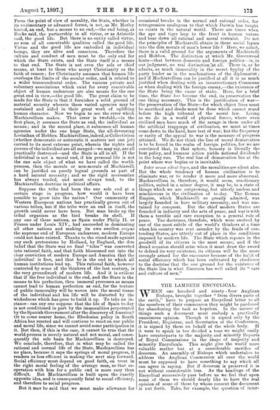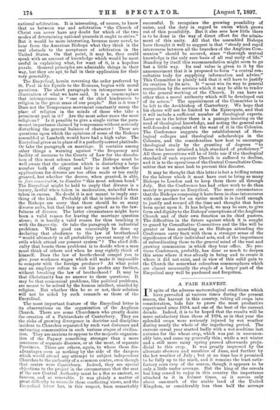THE LAMBETH ENCYCLICAL.
WHEN one hundred and ninety - four Anglican Bishops, brought together "from divers parts of the earth," have to prepare an Encyclical letter to all the members of their communion they might be pardoned for abandoning the task as hopeless. In the nature of things such a document must embody a practically unanimous opinion. Though it is signed only by the President, Registrar, and Secretaries of the Conference, it is signed by them on behalf of the whole body. If it were to speak in too decided a tone we might easily have counterparts to the majority and minority Reports of Royal Commissions in the shape of majority and minority Encyclicals. This might give the world more valuable matter but at a considerable sacrifice of decorum. An assembly of Bishops which undertakes to address the Anglican Communion all over the world must be supposed to have something to say which all can agree in saying. But if decorum is preserved it is not without considerable loss. As the headings of the Encyclical successively pass before us we feel that upon some of them we should dearly like to have the real opinion of some of those by whose consent the document is nut forth. Take, for example, the question of inter- national arbitration. It is interesting, of course, to know that as between war and arbitration "the Church of Christ can never have any doubt for which of the two modes of determining national quarrels it ought to strive." But it would be more interesting, because more novel, to hear from the American Bishops what they think is the real obstacle to the acceptaece of arbitration in the United States. On that point, it may be, they could speak with an amount of knowledge which would be most useful in explaining what, for want of it, is a hopeless puzzle. General principles are admirable things in their way, but they are apt, to fail in their application for their very generality.
The Encyclical, herein reversing the order preferred by St. Paul in his Epistle to the Romans, begins with moral questions. The short paragraph on intemperance is an illustration of what we have said. It is a commonplace that intemperance is "one of the chief hindrances to religion in the great mass of our people." But is it true ? Does not the Temperance movement constantly usurp the place of religion in the minds of those who take a prominent part in it? Are the most sober races the most religious ? Is it possible to give a single virtue the para- mount importance claimed by temperance without seriously disturbing the general balance of character ? These are questions upon which the opinions of some of the Bishops assembled at Lambeth would have had a high value. The Encyclical gives us in place of it a perfectly correct platitude. Or take the paragraph on marriage. It contains among other things a warning against " the frequency and facility of recourse to the Courts of Law for the dissolu- tion of this most solemn bond." The Bishops must be well aware that the question which is disturbing a large number both of clergy and laity is not whether the applications for divorce are too often made or too easily granted, but whether the decree, when granted, is able, in foro conscientire, to dissolve "this most solemn bond." The Encyclical might be held to imply that divorce is a luxury, lawful when taken in moderation, unlawful when taken in excess. No doubt it is not meant to imply any- thing of the kind. Probably all that is intended is that the Bishops are sorry that there should be so many divorce suits, but that they are not agreed as to the law- fulness of divorce. The latter circumstance might have been a valid reason for leaving the marriage question alone ; it is hardly a valid reason for thus touching it with the finger-tip. Or take the paragraph on industrial problems. What good can conceivably be done oy declaring that obedience to the law of brotherhood "would ultimately in all probability prevent many of the evils which attend our present system " ? The chief diffi- culty that besets these problems is to decide when a man must think of others and when he may rightly think of himself. Does the law of brotherhood compel you to give your workmen wages which will make it impossible to compete with the foreign producer ? At what point may an employer refuse to cut his profits any further, without breaking the law of brotherhood ? It may be that Christianity has no answer to these questions. It may be that economical problems, like political problems, are meant to be solved by the human intellect, unaided by religion. But whether this be so or not, their solution will not be aided by such counsels as those of the Encyclical The most important feature of the Encyclical letter is its observations on the organisation of the Anglican Church. There are some Churchmen who greatly desire the creation of a Patriarchate of Canterbury. They see the risks of growing divergence in doctrine and discipline incident to Churches separated by such vast distances and embracing communities in such various stages of civilisa- tion. They are anxious to oppose to the majestic organisa- tion of the Papacy something stronger than a mere concourse of separate dioceses, or at the most, of separate Provinces. There are others, again, to whom these dis- advantages seem as nothing by the side of the dangers which would attend any attempt to subject independent Churches to the authority of a common centre, even though that centre were Canterbury. Indeed, they see special objections to the project in the circumstance that the seat ef the new Central Authority must be a See so ancient, so famous, and so venerable. It was plainly a matter of great difficulty to reconcile these conflicting views, and the Encyclical letter has, in this respect, been remarkably successful. It recognises the growing possibility of union, and the duty in regard to union which grows out of this possibility. But it also sees how little there is to be done in the way of direct effort for the attain- ment of this unity. All that the assembled Bishops have thought it well to suggest is that "steady and rapid intercourse between all the branches of the Anglican Com- munion" should be secured, since "thorough mutual knowledge is the only sure basis of all real unity of life." Standing by itself this recommendation might seem to go but a little way. Its real value is given to it by the announcement that it is proposed to form "a central con- sultative body for supplying information and advice." This Committee is plainly told that it will have to justify its creation by its acts. It "must win its way to general recognition by the services which it may be able to render to the general working of the Church. It can have no other than a moral authority which will be developed out of its action." The appointment of the Committee is to be left to the Archbishop of Canterbury. We hope that his choice will not be limited to the Episcopate, and that it will include a sufficient number of theological experts. Later on in the letter there is a passage insisting on the need of theological knowledge, and noting the general and well-founded complaint of the want of it in the Colonies. The Conference suggests the establishment of theo- logical colleges and theological scholarships in the Colonies, and the consideration how best to encourage theological study by the granting of degrees "to those who have attained a high standard of proficiency." All these precautions will be of little use if the theological standard of each separate Church is suffered to decline, and it is to the operations of the Central Consultative Com- mittee that we must look to prevent this disaster.
It may be thought that this letter is but a trifling return for the labour which it must have cost to bring so many Bishops to London and to keep them there all through July. But the Conference has had other work to do than merely to prepare an Encyclical. The mere circumstance that the Bishops composing it have been in close intercourse with one another for an entire month is in itself enough to justify and reward all the time and thought that have been spent upon it. It has helped, we may be sure, to give form and dignity to the Bishops' conceptions of the Anglican Church and of their own function as its chief pastors. The difficulties in the future against which it is sought to guard by Consultative Committees and the like will be greater or less according as the Bishops attending the Conference carry back with them a stronger sense of the significance of their individual acts, and of the importance of subordinating these to the general mind of the vast and growing communion in which they bear office. No pre- vious Conference, probably, has done so much to deepen this sense where it was already in being and to create it where it did not exist, and in view of this solid gain to the Church the somewhat colourless commonplaces which are almost necessarily the staple of a larger part of the Encyclical may well be pardoned and forgotten.



































 Previous page
Previous page